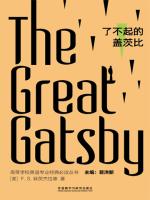The Great Gatsby
用户675711
F. Scott Fitzgerald's "The Great Gatsby" is a novel that has
stood the test of time, captivating readers since its publication in
1925. Set in the Roaring Twenties, the novel is a poignant exploration
of the American Dream, love, and the illusion of wealth and status. It
is a story that resonates with audiences even today, offering a glimpse
into a bygone era while reflecting on universal human desires and
aspirations. The narrative is centered around Jay Gatsby, a mysterious
millionaire whose lavish parties are the talk of the town. Gatsby's
opulence is a stark contrast to the more modest lives of the novel's
other characters, including the story's narrator, Nick Carraway. Nick, a
newcomer to West Egg, New York, finds himself drawn into Gatsby's world
and becomes privy to the millionaire's unrequited love for Daisy
Buchanan, a woman he once knew and loved before he went off to war.
Fitzgerald's prose is lyrical and evocative, painting a vivid picture of
the decadence and excess of the Jazz Age. The author's use of symbolism,
particularly the green light at the end of Daisy's dock, adds depth to
the narrative, symbolizing Gatsby's hopes and dreams. The novel's
structure is well-crafted, with the story unfolding through Nick's
perspective, which allows readers to experience the events and
characters with a sense of intimacy and detachment. One of the most
compelling aspects of "The Great Gatsby" is its exploration of
the American Dream. Gatsby's rise from a poor farm boy to a wealthy man
is a testament to the possibilities of the American Dream, but his
ultimate downfall serves as a critique of the materialism and
superficiality that can accompany such pursuits. The novel questions
whether the dream is truly attainable or if it is, in fact, an illusion.
The characters in "The Great Gatsby" are complex and
well-developed. Gatsby himself is a tragic figure, his love for Daisy
both his motivation and his undoing. Daisy, on the other hand, is a
character that embodies the flaws of the era, her actions reflecting the
moral decay that Fitzgerald critiques. Tom Buchanan, Daisy's husband,
represents the old money and the entrenched privilege that Gatsby
strives to emulate but can never truly attain. "The Great
Gatsby" is not just a novel about love and ambition; it is a social
commentary on the 1920s and a timeless reflection on the human
condition. It explores themes of wealth, power, and the corrupting
influence of these forces on the human soul. The novel's ending is both
tragic and fitting, leaving readers with a sense of loss and a deeper
understanding of the characters' motivations and the consequences of
their actions. In conclusion, "The Great Gatsby" remains a
powerful and relevant work of literature. Its exploration of the
American Dream, the complexities of love, and the illusions of wealth
make it a novel that continues to engage and provoke thought. F. Scott
Fitzgerald's masterful storytelling and the novel's rich themes ensure
that "The Great Gatsby" will continue to be read and admired
for generations to come.



 京公网安备 11010802032529号
京公网安备 11010802032529号